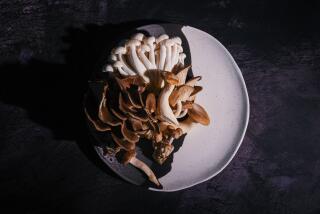The World’s Most Expensive Fungus
- Share via
Domenica Bertolusso lives on a nondescript road in a tiny village near Alba, Italy. But even if the directions to her house are sketchy or if you arrive at night, you will probably find the place by smell. The moment you reach her domicile, your nostrils will fill with a distinctive aroma--pungent, earthy, almost cheesy--the scent of fresh white truffles. Domenica and her husband, Beppe Montanaro, own TartufLanghe, Italy’s largest truffle distributor.
The truffle is a hard, roundish, aromatic fungus that grows beneath oak and other hardwood trees. Most Americans are familiar with black truffles from the Perigord region in southwest France. Italy’s white truffles are much more fragrant than the black, and they’re two or three times as expensive. Domenica calls them “white gold,” but the term white is something of a misnomer. The color ranges from ivory to light brown outside and from tan to dark brown with white veining inside.
Most of Italy’s white truffles come from the Langhe, a steep, hilly region around Alba in the Piedmont in northeast Italy. The fungus tends to turn up year after year under the same trees, but not in the same spot. Unfortunately, no one knows exactly where or when it will appear. Invisible from the surface, truffles are hunted with specially trained dogs, who sniff out their hiding spots three inches to 20 inches underground.
Saglia Severino is a 61-year-old trifolau , as truffle hunters are called in the Piedmontese dialect, from the village of Piobesce. His friend and business partner is a high-strung off-white 3-year-old mongrel dog named Diana. It took three months and a strict diet to train Diana to sniff out the costly fungus. She obviously enjoys her duties. As we walk through the woods, dead leaves crunching underfoot, Diana darts this way and that, nose to the ground, stump of a tail wagging in the air, yipping like a digital alarm gone haywire.
Suddenly she starts digging frantically with her forepaws. Saglia takes out a small hoe-shaped tool called a zappino. Together, they unearth a lumpy brown mass the size of a golf ball. There’s no mistaking the pungent smell of white truffle. Saglia rubs Diana’s nose with the truffle, then rewards her with a hug and a dog biscuit. With truffles retailing for upward of $1,300 a pound, Saglia has reason to be content with his four-legged friend.
From the end of October to the middle of January, truffle hunters from all over Piedmont bring their wares to TartufLanghe, where the odoriferous tubers will be cleaned and processed. Small, odd-shaped truffles are transformed into truffle paste, truffle oil, truffle pasta and a variety of terrines and pates . The large, unblemished ones are shipped to fine restaurants as far away as Tokyo, Sao Paolo and New York. TartufLanghe works with 5,000 professional and amateur truffle hunters throughout the Piedmont region. Last year, the company processed two tons of the odoriferous orbs.
In Italy, white truffles are sliced paper-thin and served over a variety of mildly flavored dishes such as pasta, risotto or carpaccio. The slicing is done on a truffle shaver, a sort of mandoline with an adjustable blade that enables you to cut slices thin enough to read through. When you dine at some restaurants in Alba during truffle season, the waiter weighs the truffle before and after slicing. Guests are charged according to the amount of truffle used. Unlike the black variety, white truffles are almost never cooked.
White truffles are probably the most expensive food you might ever invest in, but fortunately, a little goes a long way. A one-ounce white truffle will cost $75 to $100. Thinly shaved atop pasta or rice, it will serve four. This is expensive, but no more than an ounce of beluga caviar or a good bottle of Champagne. There is nothing that even remotely resembles the scent and taste of a fresh truffle. It’s something you should experience once in your lifetime.
If you live in a big city, you should be able to find fresh white truffles at a gourmet shop or Italian market. (You may need to order them ahead.) Truffle shavers are available at cookware shops such as Williams Sonoma. The New York mushroom importer Aux Delices des Bois (4 Leonard St., New York 10013, (212) 334-1230) sells fresh white truffles by mail.
When buying fresh truffles, let your nose be the guide. The fungus should have an intense aroma. (It reminds me of dirty gym socks with a whiff of model airplane glue!) The truffle itself should be hard and unblemished. In the Piedmont, connoisseurs debate the distinctions between truffles found under oak, poplar and willow trees. Here, we count ourselves lucky if we can find fresh white truffles at all.
Like any mushrooms, truffles are highly perishable. The classic way to store them is to bury them in rice (preferably arborio rice) in a tightly sealed jar in the refrigerator. Try to use them within one week of purchase.
One of my favorite ways of enjoying truffles is shaved over risotto. If you can’t find fresh truffles, you could sprinkle the rice with truffle oil, which is available at many gourmet shops.
Risotto is a classic rice dish of Northern Italy. It is made with a special short-grain rice called arborio, which has the ability to absorb four times its volume in liquid without becoming mushy. As the rice cooks, the starch in the grain thickens the broth into a smooth, creamy sauce. Arborio rice can be found at Italian grocery stores and specialty markets. (The best grade is “superfino.”) The short-grained Valenciana-style rice sold in Latin American markets makes an acceptable substitute. The perfect wine to serve with this dish is a Barbaresco, like the one from the legendary Piedmont winemaker Angelo Gaja.
RISOTTO WITH TRUFFLES
1/4 cup butter or olive oil
1 cup finely chopped onion
1 1/2 cups arborio rice
1/2 cup dry white wine
5 1/2 cups chicken broth, about
1/2 cup freshly grated Parmesan cheese
Salt
Freshly ground pepper
1 ounce fresh white truffle
Melt 3 tablespoons butter in large saucepan over medium heat. Saute onion 2 to 3 minutes, or until tender but not brown. Stir in rice, cook 1 minute or until all grains are shiny.
Add white wine and bring to boil, stirring constantly, until most of wine is absorbed. Heat chicken broth in separate saucepan until simmering. Add 1/2 cup chicken broth to wine mixture. Boil gently, stirring frequently, until most of liquid is absorbed. Add another 1/2 cup broth. Continue adding broth, 1/2 cup at a time, until all broth is used up. If rice is still too firm after 20 minutes, add small additional quantity of broth. (Risotto should have creamy sauce, but individual grains of rice should still be discernible.) Remove pan from heat.
Stir in remaining 1 tablespoon butter and cheese. Season to taste with salt and pepper. Spoon risotto into shallow bowls and shave truffle as thinly as possible on top. Serve at once. Makes 4 servings.
More to Read
Sign up for The Wild
We’ll help you find the best places to hike, bike and run, as well as the perfect silent spots for meditation and yoga.
You may occasionally receive promotional content from the Los Angeles Times.






